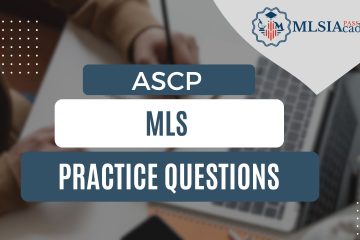MLS ASCP Certification Requirements: Essential to Meet
Do you want to apply for the ASCP medical laboratory scientist certificate?
You have to meet the MLS ASCP certification requirements to apply for this credential.
On this page, you will know about all the documents that you must have before applying for the MLS ASCP certification exam.
MLS ASCP Certification Requirements
The ASCP Board of Certification conducts its MLS (ASCP) exam for both United States and international candidates.
Therefore, it specifies some MLS ASCP certification requirements in the form of routes: 6 routes for U.S. applicants and 5 routes for international candidates.
The following is detailed information about the eligibility requirements:
U.S. Eligibility Requirements: MLS (ASCP)
- Route I: Baccalaureate degree and Medical Lab Scientist program offered by the NAACLS.
- Route II: 2 years of clinical experience in hematology, immunology, blood bank, microbiology, etc., an ASCP MLT license, and a baccalaureate degree with 16 semester hours in chemistry (with one semester hour in biochemistry or organic) and biology (with one semester hour in microbiology).
- Route III: The ASCP BOC has banned this route requirement. Currently, there are no specific criteria for this route.
- Route IV: To meet this route requirement, you must have a bachelor’s degree with 16 semester hours combination in biology and chemistry, with one semester hour in microbiology and one semester hour in biochemistry or organic, respectively, and clinical experience in related subjects that must be of 5 years.
- Route V: Clinical experience of 5 years, ASCPi MLS degree, and transcript evaluation.
- Route VI: Clinical experience of 1 year in required subjects, medical lab training course (50 weeks) accredited by the U.S. military, and 16 semester hrs bachelor’s degree in biology (1 semester hour in microbiology) and chemistry.
International Eligibility Requirements: MLS (ASCPi)
- Route I: Chemistry, biological science, or medical lab science bachelor’s degree & training program in medical laboratory science; must be in hematology, chemistry, blood bank, and microbiology.
- Route II: Clinical experience in microbiology, chemistry, blood bank, and hematology that must be of 3 years and a medical lab science baccalaureate degree.
- Route III: 2 years of a training program in medical lab science (in microbiology, hematology, blood banking, and chemistry) and a baccalaureate degree.
- Route IV: 5 years of clinical experience must be in microbiology, hematology, chemistry, and blood banking, and a baccalaureate degree (must be in chemistry or biological science).
- Route V: 2-year diploma (must be in chemistry or biological science) bachelor’s degree, and clinical experience that must be of at least 5 years in chemistry, microbiology, hematology, and blood bank.
MLS ASCP: Common Documentation
- Official transcript: for study in the U.S. and Canada
- Foreign transcript evaluation: for study outside of the U.S. or Canada
- Letter of authenticity: must be with experience and training documentation form.
- Military training official certificate: only for U.S. candidates
Frequently Asked Questions for the MLS ASCP Certification Requirements
What is the MLS ASCP certification requirements?
To apply for the ASCP medical lab scientist certificate, you must have a baccalaureate degree, clinical experience, and training programs in relevant subjects.
Does the ASCP BOC present any alternative to meet the MLS ASCP certification requirements?
Yes, of course, ASCP BOC suggests 6 routes for U.S. applicants and 5 routes for international applicants. You only need to satisfy one route prerequisite.

Abdelhalim Elshawadfy is an ASCP certified Medical Laboratory Scientist (MLS ASCP), Specialist in Microbiology (SM ASCP), and Molecular Biology Technologist (MB ASCP) with a distinguished career marked by expertise, continuous learning, and a commitment to elevating the standards of clinical laboratory science. As an ASCP Certification Expert and American Board Certification Expert, Abdelhalim Elshawadfy continues to make invaluable contributions to the field, leaving a lasting impact on the medical community.



